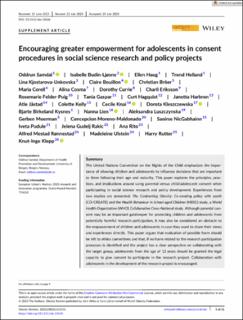| dc.contributor.author | Samdal, Oddrun | |
| dc.contributor.author | Ljøsne, Isabelle Sylvie Budin | |
| dc.contributor.author | Haug, Ellen Merethe Melingen | |
| dc.contributor.author | Helland, Trond | |
| dc.contributor.author | Kjostarova-Unkovska, Lina | |
| dc.contributor.author | Bouillon, Claire | |
| dc.contributor.author | Bröer, Christian | |
| dc.contributor.author | Corell, Maria | |
| dc.contributor.author | Cosma, Alina | |
| dc.contributor.author | Currie, Dorothy | |
| dc.contributor.author | Eriksson, Charli | |
| dc.contributor.author | Felder-Puig, Rosemarie | |
| dc.contributor.author | Gaspar, Tania | |
| dc.contributor.author | Hagquist, Curt | |
| dc.contributor.author | Harbron, Janetta | |
| dc.contributor.author | Jåstad, Atle | |
| dc.contributor.author | Kelly, Colette | |
| dc.contributor.author | Knai, Cecile | |
| dc.contributor.author | Kleszczewska, Dorota | |
| dc.contributor.author | Kysnes, Bjarte Birkeland | |
| dc.contributor.author | Lien, Nanna | |
| dc.contributor.author | Luszczynska, Aleksandra | |
| dc.contributor.author | Moerman, Gerben | |
| dc.contributor.author | Moreno-Maldonado, Concepcion | |
| dc.contributor.author | NicGabhainn, Saoirse | |
| dc.contributor.author | Pudule, Iveta | |
| dc.contributor.author | Rakic, Jelena Gudelj | |
| dc.contributor.author | Rito, Ana | |
| dc.contributor.author | Rønnestad, Alfred Mestad | |
| dc.contributor.author | Ulstein, Madeleine | |
| dc.contributor.author | Rutter, Harry | |
| dc.contributor.author | Klepp, Knut Inge | |
| dc.date.accessioned | 2024-02-12T13:20:14Z | |
| dc.date.available | 2024-02-12T13:20:14Z | |
| dc.date.created | 2023-10-11T10:55:29Z | |
| dc.date.issued | 2023 | |
| dc.identifier.issn | 1467-7881 | |
| dc.identifier.uri | https://hdl.handle.net/11250/3117024 | |
| dc.description.abstract | The United Nations Convention on the Rights of the Child emphasizes the importance of allowing children and adolescents to influence decisions that are important to them following their age and maturity. This paper explores the principles, practices, and implications around using parental versus child/adolescent consent when participating in social science research and policy development. Experiences from two studies are presented: The Confronting Obesity: Co-creating policy with youth (CO-CREATE) and the Health Behaviour in School-aged Children (HBSC) study, a World Health Organization (WHO) Collaborative Cross-National study. Although parental consent may be an important gatekeeper for protecting children and adolescents from potentially harmful research participation, it may also be considered an obstacle to the empowerment of children and adolescents in case they want to share their views and experiences directly. This paper argues that evaluation of possible harm should be left to ethics committees and that, if no harm related to the research participation processes is identified and the project has a clear perspective on collaborating with the target group, adolescents from the age of 12 years should be granted the legal capacity to give consent to participate in the research project. Collaboration with adolescents in the development of the research project is encouraged. | en_US |
| dc.language.iso | eng | en_US |
| dc.publisher | Wiley | en_US |
| dc.rights | Navngivelse-Ikkekommersiell 4.0 Internasjonal | * |
| dc.rights.uri | http://creativecommons.org/licenses/by-nc/4.0/deed.no | * |
| dc.title | Encouraging greater empowerment for adolescents in consent procedures in social science research and policy projects | en_US |
| dc.type | Journal article | en_US |
| dc.type | Peer reviewed | en_US |
| dc.description.version | publishedVersion | en_US |
| dc.rights.holder | Copyright 2023 The Author(s) | en_US |
| dc.source.articlenumber | e13636 | en_US |
| cristin.ispublished | true | |
| cristin.fulltext | original | |
| cristin.qualitycode | 1 | |
| dc.identifier.doi | 10.1111/obr.13636 | |
| dc.identifier.cristin | 2183648 | |
| dc.source.journal | Obesity Reviews | en_US |
| dc.identifier.citation | Obesity Reviews. 2023, 24 (S2), e13636. | en_US |
| dc.source.volume | 24 | en_US |
| dc.source.issue | S2 | en_US |

